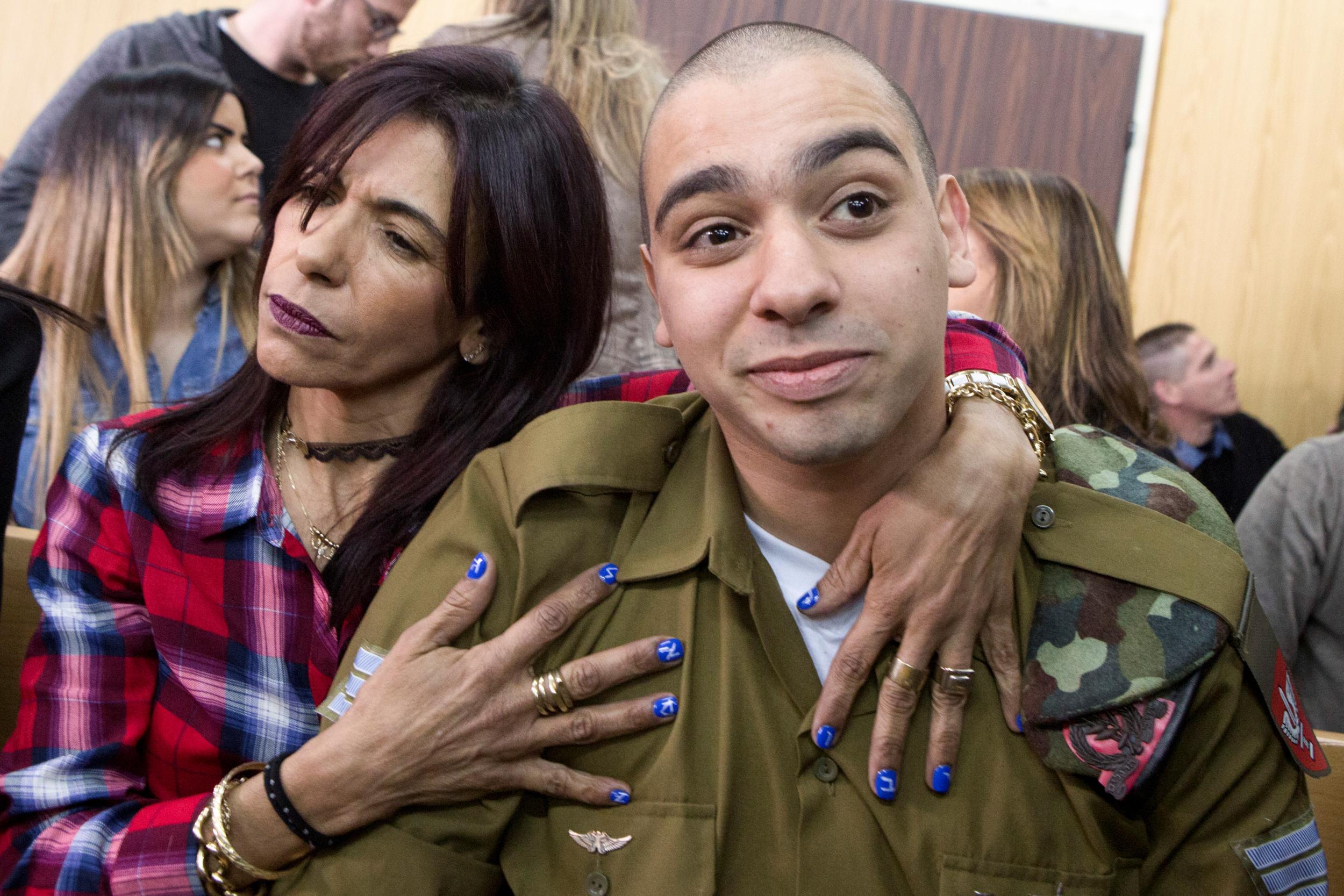Elor Azaria: Israeli soldier sentenced to 18 months in jail for shooting dead wounded Palestinian attacker
Uproar in Palestinian and left-wing Israeli circles over 'minimal' sentencing in polarising case involving killing of Palestinian assailant who ‘posed no threat’
An Israel Defence Force (IDF) medic who shot a Palestinian assailant in the head when he was immobilised on the ground last year has been sentenced to a year and a half in prison after being found guilty of manslaughter by a Tel Aviv military court last month.
The landmark ruling against the now 20-year-old Sergeant Elor Azaria marked the first time a member of the IDF had been convicted of the charge in 12 years.
The prosecution had sought a sentence of between three and five years, although manslaughter can carry a sentence of up to 20 years under Israeli law.
Azaria, who on Tuesday was given 18 months of jail time and 12 months on probation for the killing of Abdel Fattah al-Sharif, had asked beforehand for the judges to "show mercy" to him and his family. The medic was also demoted to the rank of private.

"If [a Palestinian] kills an animal ... he would have gotten more time," Mr Sharif's father Yusri told reporters from the West Bank.
21-year-old al-Sharif was shot and wounded after he and an accomplice stabbed and wounded an Israeli soldier in Hebron in March last year. As the attacker lay on the ground, Azaria, who arrived on the scene 11 minutes later, delivered a fatal wound by shooting him in the head. The killing was captured on video and widely shared by Israeli human rights group B'Tselem.
In a damning January verdict, Justice Maya Heller said that Azaria had been aware that his actions in shooting the wounded Palestinian assailant would result in loss of life, and that “the terrorist did not pose a threat”.
The IDF recruit did not act in accordance with army protocol, the three-judge panel found, and the claim that he felt threatened because Mr Sharif may have been carrying explosives or still been able to reach for his knife was not justified.
The case – and the military court's verdict – has split Israeli society, where there is widespread sympathy for the IDF, since military service is compulsory.
An August survey by the Israel Democracy Institute found that 65 per cent of the Jewish Israeli public supported Azaria's claim of self-defence.
There have been several fundraisers and protests in support of the soldier, as well as high profile calls for the young recruit to be given a pardon by Israeli Prime Minister Benjamin Netanyahu.
Around 100 supporters continuing to protest the guilty ruling and sentencing gathered outside the court on Tuesday, holding banners reading "death to terrorists."
Prominent right-wing Jewish Home politician Naftali Bennett immediately called for a pardon. "[Azaria] cannot go to jail or we will all pay the price," he tweeted.
Mr Sharif's family has previously called for the soldier to receive a life sentence. His defence team has already said they will appeal the conviction.
The soldier's trial come amid a recent spate of Israeli-Palestinian violence which has been dubbed the “Jerusalem intifada”.
In the past 18 months, 36 Israelis have been killed in mostly stabbing and shooting incidents carried out by Palestinian assailants. At least 244 Palestinians – including unarmed bystanders and demonstrators – have been killed by IDF forces in the same period, Palestinian rights groups claim.
“Sending Elor Azaria to prison for his crime sends an important message about reigning in excessive use of force," Sari Bashi, Human Rights Watch's Israeli and Palestinian advocacy director said.
“But senior Israeli officials should also repudiate the shoot-to-kill rhetoric that too many of them have promoted, even when there is no imminent threat of death. Pardoning Azaria or reducing his punishment would only encourage impunity for unlawfully taking the life of another person.”
Join our commenting forum
Join thought-provoking conversations, follow other Independent readers and see their replies
Comments